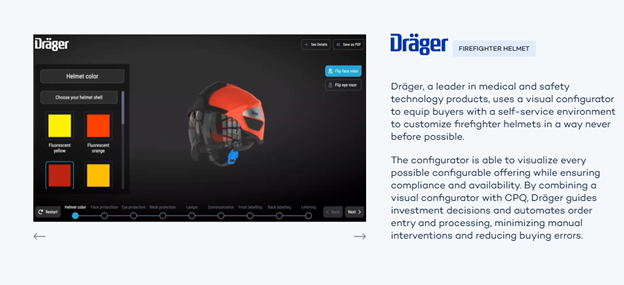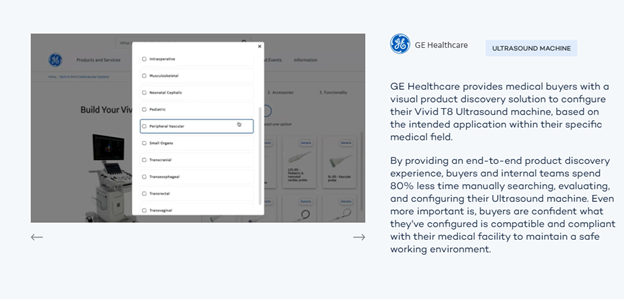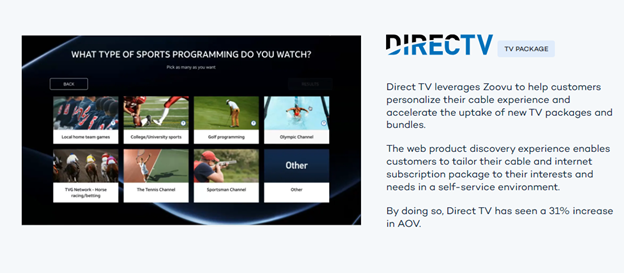As buyers demand faster, easier, and more personalized experiences, B2B companies are looking for resources that help them keep up. That’s not an easy task. And in the meantime, expectations keep growing.
Seventy-three percent of buyers expect a business to understand their personalized needs and expectations, and 88% say this matters as much as a company’s products and services. Creating a fantastic product, then, is only part of the equation. The other part is how you deliver it.
For B2B businesses, much of the “how” is tied to the sales quoting process, and that’s where options for self-service or visual CPQ software come into play.
This post will help you learn how to successfully leverage CPQs to optimize the sales process and improve the buyer experience.
Benefits of Using CPQs in B2B Ecommerce
Many sales teams are on the verge of burnout. In recent surveys, 57% of sales representatives say their workload exceeds capability, and 67% admit they’re logging more than their contracted hours.
CPQs help reduce the administrative burden on sales teams and support faster B2B sales cycles, which are notoriously longer than their B2C counterparts. CPQ also does the following:
- Speeds up the quote-to-cash cycle. CPQs leverage automations, allowing your team to configure price quotes faster while reducing human errors that slow down the sales process and detract from customer satisfaction.
- Enhances customer experience through personalization. Sales reps can tailor products based on customer needs and considerations. These customized experiences create more relevant and meaningful buyer experiences.
- Optimizes pricing strategies. Accurate pricing is critical to profitability, and CPQ allows you to generate more accurate quotes. The software enables real-time dynamic pricing based on your configurations.
- Simplifies product configuration and customization. CPQs streamline product configuration and allow your team to customize inputs based on a customer’s personalized needs quickly.
- Improves operational efficiency. Automating and optimizing your quoting process allows teams to capture greater efficiency and sets them free to work on higher-level tasks. It also saves them from the frustrating job of hunting down relevant data to pull into quotes.
Challenges in Implementing CPQ for B2B Ecommerce
Not all CPQ tools are created equal, but if you know what to look for, you can avoid many of the most common growing pains. These pains happen when a tool lacks the functionality that helps keep your data flowing quickly and accurately. Potential challenges include integration, employee adoption, and data quality issues.
Integration with Existing Systems
When your CPQ system doesn’t talk to your other tools, such as your CRM, ERP, and B2B ecommerce platform, it is frustrating for all parties. Without seamless integrations, data doesn’t flow smoothly, resulting in a lack of real-time modifications, slowdowns, and a fragmented customer experience.
Training and Adoption
Implementation success for any tool, including your CPQ, depends on how well it’s used. CPQ software often comes with a learning curve, requiring training for sales, operations, and IT teams. Providing this support is critical since internal resistance can slow the speed of adoption and stunt a healthy ROI.
Data Quality and Management
For CPQ software to serve its users best, it needs a foundation of quality data. When you feed it accurate information, it gives back reliable pricing and product configurations, making everyone’s job easier. But with poor data, you might face misleading quotes, potentially letting customers down and putting your brand’s trust on the line. It’s not just about technology; it’s about ensuring your tools are equipped to look after the people relying on them.
Overcoming the Challenges of Implementing a CPQ
The good news about CPQ challenges is that you can avoid many of them by considering potential issues early in the selection process. When you prioritize integration, for example, seek out the best CPQs for SAP or Salesforce to mitigate your risk. When you make data quality a top priority, you can sidestep many data management-related challenges.
As you work to avoid common challenges in implementing CPQ, consider the following:
Seamless Integration
Clunky and difficult integrations aren’t only a risk to productivity, they’re also a risk to employee satisfaction. Lack of integration often results in time-consuming, frustrating workflows, and some employees might even create workarounds that help them do their job quicker, but lead to messy, fragmented data and processes that are both hard to maintain and break easily.
Select a CPQ solution with robust integration features that work seamlessly with your other technologies, such as your CRM and B2B ecommerce business platform. For example, Zoovu offers easy-to-implement APIs and built-in connectors that ensure smooth integration with your existing tools.
AI-Powered Guidance
Busy, frustrated, and overwhelmed sales teams need more support. You can provide it by selecting CPQ tools that make your team’s job easier. For example, guided selling CPQs walk your team through the selling process, speeding up adoption and reducing human errors. Zoovu creates custom question flows and conversational assistants to personalize product recommendations and display complementary products and bundles based on tailored needs.
Data Quality and Management
With product data scattered across different formats—PDFs, CSVs, and marketing materials, rolling out a functional CPQ solution can feel like piecing together a complex puzzle where the pieces are spread far and wide. Traditional methods to tidy up a mess of product data are not only a drain on time and resources; they can also prolong the journey towards a streamlined online sales system. Our AI-driven platform automates the transformation of unstructured data into a cohesive, ecommerce-ready format, expediting the CPQ integration and enabling a quicker, more cost-effective path to digital sales optimization.
Connect buyers to the right products and empower your sales teams to sell with confidence.
B2B Ecommerce: Real-World Examples of CPQ Functionality
Speed, agility, and efficiency are things that every company wants. CPQs helps businesses achieve these goals by supporting the efficient configuration of complex products. A few industries that may benefit include manufacturing, healthcare, and telecom.
CPQs for Manufacturing
Supply chain disruptions, increased product customization, and rising competition are just a few of the significant challenges manufacturers face. Fortunately, CPQs help lessen the complexity for buyers:
Speed of Custom Orders
With products and manufacturing becoming increasingly complex, speeding up the path from customer inquiry to completed quote is critical. CPQ enables faster ordering through faster and more accurate configurations. And faster quotes lead to faster buying decisions.
Dynamic Pricing
The cost of materials is often a moving target. Dynamic, customized pricing ensures that quotes are current and aligned with real-time material costs. This capability helps prevent accidental underquoting and helps to safeguard profit margins.
Example: Dräger
Dräger is a company that manufactures medical and safety technology products. Using a visual product configurator, the company enables a self-service environment and a level of customization that wasn’t possible in the past for firefighting helmets.
The configurator allows the user to visualize every possible configuration and helps ensure local compliance and product availability. By combining the visual configurator with CPQ, the company guides buying decisions, automates order entry and processing, and supports error-free quote generation.

Read how Zoovu’s Configuration Studio enables you to sell complex products while delivering a fast, digital buying experience. Save time. Configure and create quotes faster.
CPQ for Healthcare
With the ever-increasing complexity of healthcare products and services, generating fast and accurate quotes is essential. Compliance is foundational in the healthcare space, and CPQ helps in this area and many others, including:
Guidelines and Standards
Processes that support compliance not only help companies keep up with fast-changing regulations but do so quickly and efficiently. CPQ integrates guidelines and standards directly into the quoting process, ensuring that quotes meet compliance and the most up-to-date regulations. This direct integration creates a safety net to help mitigate errors.
Complex Service Bundling
The healthcare industry often bundles services into packages, such as those related to diagnostics, treatments, or follow-ups. CPQ allows providers to configure and price services to streamline the quoting process easily. As a result, it’s easier to offer related services while mitigating the risk of pricing missteps.
Example: GE HealthCare
GE HealthCare offers B2B buyers a visual product discovery solution for the company’s Vivid T8 Ultrasound. The user experience is personalized for the customer’s specialization and intended product application.
Providing this end-to-end product discovery experience has allowed the company’s customers and internal teams to spend 80% less time on tasks such as manually searching for, evaluating, and configuring ultrasound machines. Buyer confidence is also improved with the knowledge that the configuration is compatible and compliant.

CPQ for Telecom
The telecom industry is known for bundling products and services, including internet, cable, cell service, and others. This bundling requires complicated product and service configurations with dynamic, customized pricing. CPQ automates and optimizes pricing strategies to ensure that quotes are accurate and aligned with real-time market data.
DIRECTV leverages Zoovu to support customers by personalizing their cable experience and increasing the uptake of new TV packages and bundles.
The web product discovery experience empowers customers to tailor cable and internet subscription packages based on needs through a self-service experience.
Using this approach, DIRECTV has experienced a 31% increase in average order value.

***
Customer demands are evolving — and there is no turning back. As these demands fuel the need to personalize and product complexity grows, replacing massive, confusing product catalogs with interactive experiences will help you stand out against competitors.
CPQs and visual product configuration allow you to meet customers where they’re at, with the experiences they expect, while staying agile and supporting profits and growth.
If you’re looking to learn more about how to leverage guided selling product configurators and CPQ, check out Zoovu. Request a demo.


